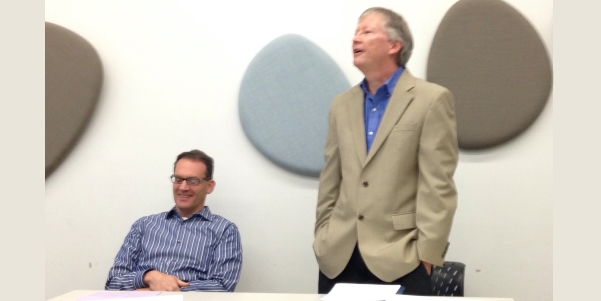At a debate on October 7, 2016 sponsored by PLAN-Boulder County about the merits of Ballot Issue 302—which would limit the number of terms that a Boulder City Council member could serve, proponent Andy Schultheiss contended that it would tend to enable the election of people with more diverse backgrounds, while opponent Richard Valenty argued that it is not needed and would exclude people with valuable experience from the council.

PBC Forum participants Andy Schultheiss (seated) and Richard Valenty
Ballot Issue 302 would disqualify from Boulder City Council election anyone who has held office in that body for three or more terms. Elections automatically occur every two years for five of the nine Boulder City Council positions—four for four-year terms and one for a two-year term. But in some years more positions are vacant because incumbents have recently resigned or decided not to run for re-election. Ballot Issue 302 would preclude two current council members—Matt Appelbaum and Lisa Morzel—from further terms on the council. However, Appelbaum has already publicly declared that he will not seek re-election.
Schultheiss is executive director of Open Boulder, which spent about $30,000 to gather signatures to place this initiative on the ballot. He has previously been a Boulder City Council member and an aide to Congressman Jared Polis. Valenty worked for years as a reporter for The Colorado Daily before it was purchased by The Daily Camera and has more recently been employed as a legislative assistant to State Senator Rollie Heath and an aide in the Colorado Senate.
Schultheiss observed that one of his functions at Open Boulder has been to try to convince new people to run for the Boulder City Council and that they were often deterred by the possibility that they would lose. He asserted that term limits would mean more “open” seats in City Council elections—that is, seats for which an incumbent was not running—and that “open” seats are much easier for newcomers to win.
Valenty remarked that people who refrain from council campaigns because they are afraid of a loss may not have the kind of tenacity and confidence needed to hold public office. He also pointed out that in the past two City Council elections (2013 and 2015), three of the five winners were first-timers, that first timers were the top vote-getters in the past three elections (2011, 2013 and 2015), and that first-timers won the two special elections in 2005 and 2007. So newcomers, he asserted, seem to have no difficulty being elected to the Boulder City Council. He pointed out that one incumbent lost in the 2015 election and claimed that the natural way to limit the terms of incumbents is simply to vote them out of office.
Schultheiss also argued that term limits would encourage more people without prior experience on City of Boulder boards and commissions to campaign for the council, because more seats would be open. He acknowledged that Open Boulder tries to encourage people who are entirely new to Boulder City government to seek council positions as a way to “open up” local government. Valenty responded in part by asserting that Boulder seems to have no difficulty in attracting lots of newcomers to run for Boulder City Council. He noted that 22 people ran for council in the last City Council election he covered for The Colorado Daily.
Valenty also extolled the value of prior experience on city boards and commissions as helpful preparation for council service. People with that experience tend to be educated about the city’s processes and operations and need much less time to orient themselves and become effective as council members, he implied.
Valenty furthermore lamented the way in which term limits arbitrarily bar seasoned legislators from further service. He said that eight senators in the Colorado Senate “who have very good records and a lot of knowledge” were term-limited this year. Their loss will be a “brain drain,” he said; and new legislators are more prone to be guided by lobbyists and special interest groups than are veterans.
Schultheiss countered that many, if not most, of those term-limited state senators will be succeeded by able, qualified replacements. For instance, although he expressed regret that Senator Heath will be leaving the Senate, he lauded Heath’s likely successor, Democratic party nominee Steve Fenberg, as an outstanding prospect.
Valenty said that he had reviewed the composition of the Boulder City Council during the last 49 years and discovered that only six of its members during that period had continued on the council for more than 12 years (three, four-year terms). So in the future, Ballot Issue 302 would probably have little impact on council membership. Schultheiss commented that this argument seemed to contradict Valenty’s previous contention that Ballot Issue 302 would reduce the stock of valuable legislative experience on the City Council.
Schultheiss maintained that many state legislatures, including Colorado’s, have instituted term limits, as well as nine of ten of the nation’s largest cities, and the neighboring cities of Ft. Collins, Longmont, Louisville and Lafayette. They did so for good reasons, he insisted, such as keeping entrenched interests from holding power too long. Valenty insisted that term limits may be warranted in other jurisdictions, but not in the City of Boulder.
Schultheiss also claimed that by opening up more positions, Ballot Issue 302 would lead more people from diverse backgrounds, including ethnic minorities and renters, to run for the council. Valenty replied by observing that in recent decades ethnic minority members who have run for council have been elected and that renters have been candidates for council at least in recent elections. At the end of the debate, during audience questions, one audience member asserted that Ballot Issue 302 might end up forcing ethnic minority members off the council, such as incumbent Mary Young, who is Mexican-American.
Not surprisingly, the debate ended without a resolution of the issue. That will occur on November 8.
WATCH a video of the debate here.


